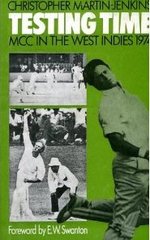Testing Times
Martin Chandler |Published: 1974
Pages: 173
Author: Martin-Jenkins, Christopher
Publisher: MacDonald and Janes
Rating: 4 stars

Given the right equipment anyone, anywhere in the world, can now watch every single delivery of any Test match, and they can also hear the play described by expert commentators and summarisers. Just a generation ago that was never the case, and there was a considerable demand for written accounts of Test tours, in themselves rather less common occurrences than they are now. So it was only as the 1970s gave way to the 1980s that the market for the story of Test tours in book form started to wane. For the bi-annual contests for the Ashes there is still a demand for good writing, and whilst the traditions associated with that historic contest remain, in all probability that desire will be sufficient to keep publisher’s interested, but for other tours we seldom now see anything.
Christopher Martin-Jenkins, known universally as CMJ, has written more tour books than most, his first being this one, published after what must have been a most pleasant assignment for a 28 year old, following England through the Caribbean for the BBC between January and April of 1974. The genre was already becoming less attractive to publishers, this being the only account to appear of what proved to be an interesting series that, contrary to expectations and, as they say in football parlance, somewhat against the run of play, England managed to emerge from with a share of the spoils. England’s previous tour of the Caribbean, six years previously, had been the subject of three books
The first Test in 1974 set the tone of the tour with West Indies taking a substantial first innings lead before England, courtesy on this occasion of Geoffrey Boycott and, particularly, Dennis Amiss, fought a superb rearguard action. Well as the openers battled however no one else weighed in with a major contribution and West Indies won that game. The second and third Test’s repeated the pattern but on both those occasions England did escape, in Jamaica thanks to a remarkable unbeaten 262 by Amiss, and in Barbados due in the main to an undefeated century by Keith Fletcher. The fourth match was ruined by rain before, bowling the slow medium off spin he had unveiled as recently as the Jamaican Test, Tony Greig recorded the best figures by an English spin bowler since Jim Laker’s legendary 19-90 at Old Trafford in 1956
Mike Denness, who had not played for England at all in the 1973 summer, got the captaincy for the Caribbean, and there is an interesting introduction to the book that puts the tour, the captaincy issue and the party selected in the context of the state of English cricket at the time. What follows from there is an account of the cricket itself, and not just the Tests. There is enough about the other tour matches to keep the reader “in the loop” about what was going on in the background. All the tour’s highs and lows are fully dealt with, the over-zealous run out (subsequently rescinded) of Alvin Kallicharran by Tony Greig having a chapter to itself.
CMJ was always the perfect man to write a tour book. He had a deep knowledge of cricket’s rich history, but at the same time knew enough about the technical side of the game to be able to analyse the play authoritatively as well as describe it impeccably. The eight pages of the closing chapter, entitled Analysis of a Daylight Robbery tell the reader in the most succinct terms, in case he hasn’t already worked it out for himself, the lessons that the trip taught to all concerned.
The narrative part of the book, 149 pages, is perfectly paced, and there are then 24 pages of scorecards and statistics and, appropriately located, there are a total of twenty pages containing an interesting selection of photographs. There is one thing missing, but neither author nor publisher can be held responsible for that. Now that he is no longer with us I cannot help but wish that somebody had asked CMJ to re-read the book last year, with a view to publishing a new edition, with an additional chapter comprising his further reflections all but four decades on. They would have been fascinating thoughts, of that I have not the slightest doubt, but sadly are now lost. But at least we do still have Testing Times, and the rest of CMJ’s impressive oeuvre, and cricket historians of the future, as well as those with just a casual interest in the great cricketing contests of the last quarter of the 20th century, will forever be grateful for that.







Leave a comment